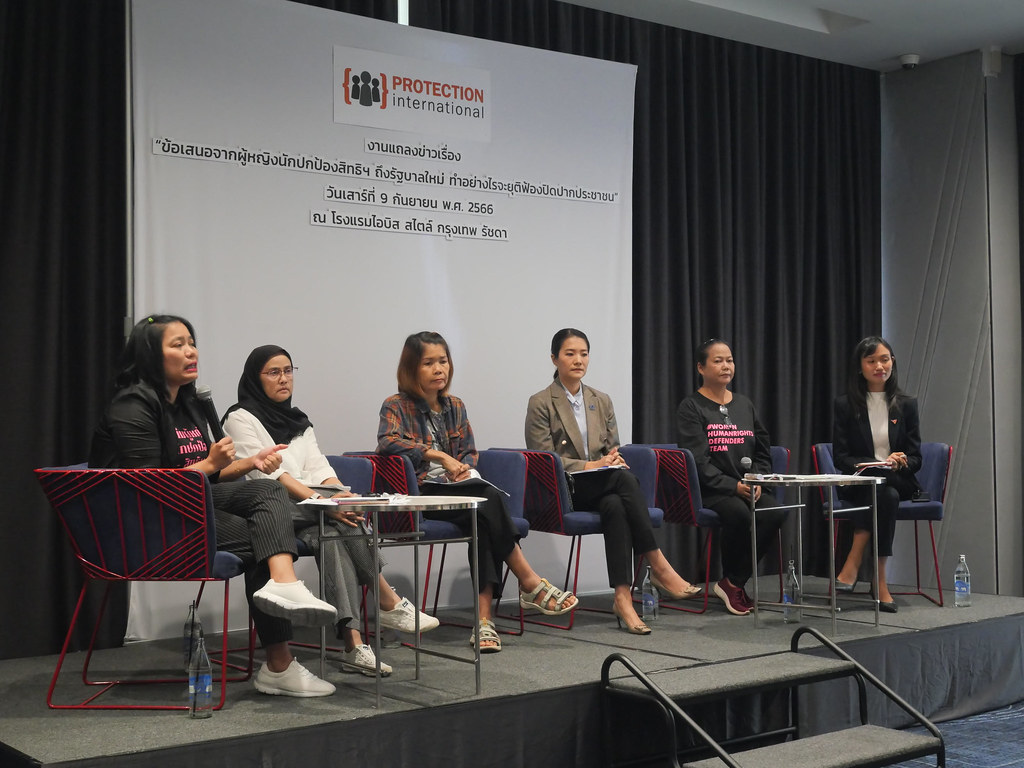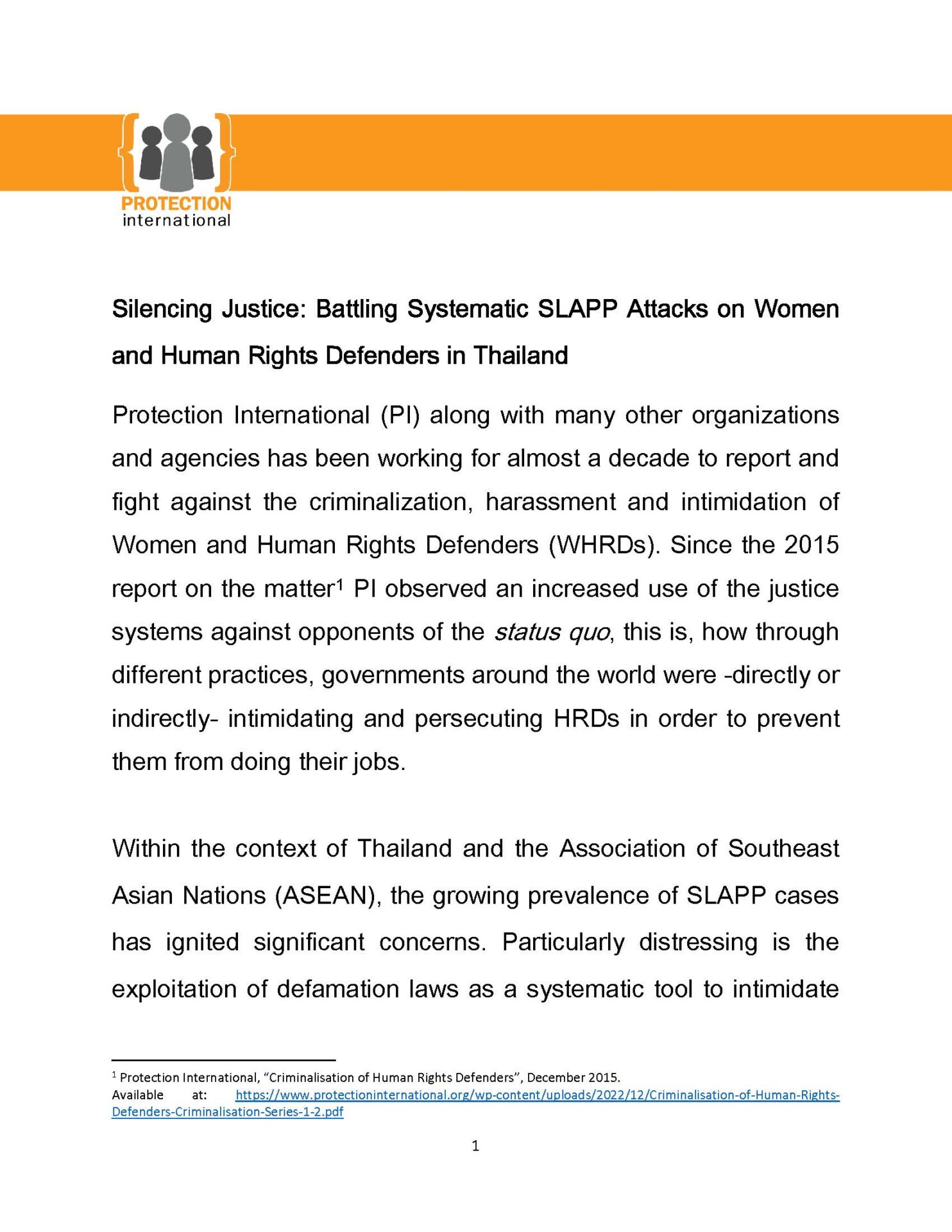After four years of relentless advocacy and legal battles, a significant milestone has been reached in SLAPP Attacks in Thailand. Three cases of defamation and SLAPP (Strategic Lawsuits Against Public Participation) against Women Human Rights Defenders (WHRDs) were declared insubstantial, setting a precedent for future cases. This landmark decision marks a turning point in the fight for justice and human rights.
SLAPP attacks are more than just legal cases; they are a form of intimidation aimed at silencing WHRDs. In Protection International, we have documented that since 2014, 570 SLAPP cases have been prosecuted in Thailand, based on 11 types of offenses. This makes SLAPP attacks a systematic form of intimidation against WHRDs.
“Among the barriers to meaningful participation seen in the Thai context is the systematic use of SLAPPs by businesses to silence HRDs and whistleblowers who publicly report on business-related human rights abuses. […] women and environmental HRDs are facing prison sentences and heavy fines just for exercising the right to freedom of expression and opinion,” – Angkhana Neelapaijit, Representative of the UN Working Group on Enforced or Involuntary Disappearances.
Moreover, SLAPPs disproportionately affect women. They not only face legal repercussions but also societal prejudices that exacerbate their vulnerabilities. The emotional and financial toll of these lawsuits often extends to their families and communities, creating a ripple effect of intimidation and fear. Protection International has been involved in combating these attacks for years.
The Transformative Power of Collective Action
“WHRDs are critical agents of change; they are the backbone of communities in the participation in social and political life, essential to building a sustainable society where no one is left behind and so their fight is our fight and as a society, we must stand with them and support them in their endeavors to ensure that this extremely problematic practice of using SLAPP to silent voices is put an end to.” – Angkhana Neelapaijit, Representative of the UN Working Group on Enforced or Involuntary Disappearances.
Following the judicial decision where three cases of defamation and SLAPP against WHRDs were found not guilty, Protection International, along with the community WHRDs collectives in Thailand, organized a press conference. The subject was “Recommendations from Women Human Rights Defenders to the New Government: Combating SLAPP against the Public.” The attendance of the new Minister of Justice (MOJ) was particularly noteworthy, signaling a potential shift in governmental attitudes towards WHRDs.
In recent years, the Thai government has faced criticism for enabling companies to engage in judicial harassment. This has raised concerns from various international bodies, including the UN, which have expressed concern and issued recommendations to protect WHRDs. But more recently, we’ve witnessed the official launch of the draft of the second National Action Plan on Business and Human Rights (2023-2027) (NAP2). However, the NAP2 plan makes no mention of protection measures. These events collectively prompted us to take action, reinforcing the importance of collective efforts in combating SLAPP attacks and supporting WHRDs.
Given the situation, we also launched a report titled “Silencing Justice: Battling Systematic SLAPP Attacks on Women and Human Rights Defenders in Thailand.” The report underscores the urgent need for systemic change to protect human rights defenders, particularly women, from judicial harassment and SLAPP lawsuits. It calls for immediate action from both the Thai government and international bodies to address this growing crisis.
PI’s Comprehensive Report on SLAPP Attacks in Thailand
The report concludes with a comprehensive list of recommendations aimed at the Thai Government and relevant companies, urging immediate action to protect WHRDs. Each of these recommendations is backed by extensive research and analysis, aiming to provide a roadmap for systemic change in the way SLAPP attacks are handled in Thailand and create a safer environment for WHRDs.
- End Violence and Support Rights: Thai authorities should immediately halt all forms of violence, intimidation, and harassment against women and human rights defenders (HRDs). The government should also support community management of land and natural resources.
- Compliance Report: The Thai government should provide a report detailing their adherence to the UN’s Guiding Principles on Business and Human Rights and the 2018 recommendations from the United Nations Working Group on Business and Human Rights.
- Judicial Review: An urgent, impartial review of convictions against communities and HRDs is needed to overturn any rulings incompatible with UN Human Rights treaties.
- Ineffective NAP: The National Action Plans (NAPs) on Business and Human Rights lack legal weight and have not effectively protected or recognized the work of Women Human Rights Defenders (WHRDs).
- Review Section 161/1: An urgent review of Section 161/1 of the Thai Criminal Procedure Code is needed to provide clearer definitions, such as “bad faith.”
- Attorney-General’s Role: All complaints under Section 21 of the 2010 Public Prosecutor Organ and Public Prosecutors Act go to the Attorney-General, a process that lacks clarity and may be inadequately resourced.
- Penalties for Harassment: There’s no clear procedure for fining or penalizing those guilty of judicial harassment of WHRDs. Consequences should be political, financial, and judicial.
- Accountability: The State must prevent all threats and harassment against defenders. Those failing in their duty of care must face appropriate consequences.
- Decriminalize Defamation: Defamation should not be a criminal offense. The UN Working Group (UNWG) and other agencies should advocate for its decriminalization in Thailand.
- CEDAW Compliance: The Thai government should report on its progress in complying with recommendations from the Committee on the Elimination of Discrimination against Women (CEDAW) and the UN Working Group on Business and Human Rights.
- Stakeholder Responsibility: All stakeholders should invest resources and influence to stop the judicial harassment of WHRDs and promote responsible business practices committed to human rights.
- UNWG Evaluation: The UN Working Group on Business and Human Rights should independently assess Thailand’s first National Action Plan on Business and Human Rights to provide valuable insights for future plans.
Protection International remains committed to battling SLAPP attacks and supporting WHRDs in Thailand. We are keen on continuing our collaboration with the Minister of Justice and referring cases to them to use the state mechanism to support WHRDs effectively. Our long-term commitment is not just to individual cases but to systemic change that makes the legal landscape safer for all human rights defenders.



 English
English